|
Genre movies, particularly those of the Hollywood mainstream variety, do tend to play to specific pre-set formulas, although some genres are more guilty of this than others. As an example, let's take a look at a typical plot for the hip-joined duo of romantic drama and romantic comedy, which by their very nature must feature two and often three key characters, whom I'll refer to here simply as X, Y and Z. I should note that the people in question are completely gender fluid, but classic Hollywood favoured casting X and Z as men and Y as a woman. It was almost never the reverse – in such films, women who chased men were often portrayed in a very different light, if you get my drift.
The story goes like this. X is seriously attracted to Y, but Y is not romantically interested in X, in part because she is already engaged to be married to Z. X persists anyway, initially annoying Y, but over time Y softens to X and discovers that she rather likes him after all and perhaps even more than she likes Z. To make things easy for the audience to take sides, X is usually portrayed as lively, witty and likeable, Y is shown to be attractive and bubbly, and Z comes across as a well-intentioned but straight-laced bore. We're steered from an early stage to realise that X and Y really belong together, and that a lifetime with Z would ultimately grind the very things that make Y such fun into the dust. Thus, from the moment we first meet them, we know it's only a matter of time before Z does something to reveal that he's not the man that Y thought that he was, prompting her to realise what a mistake she has made and flee happily into the arms of X instead. Cue closing title music and an audience full of warm hearts and contented smiles.
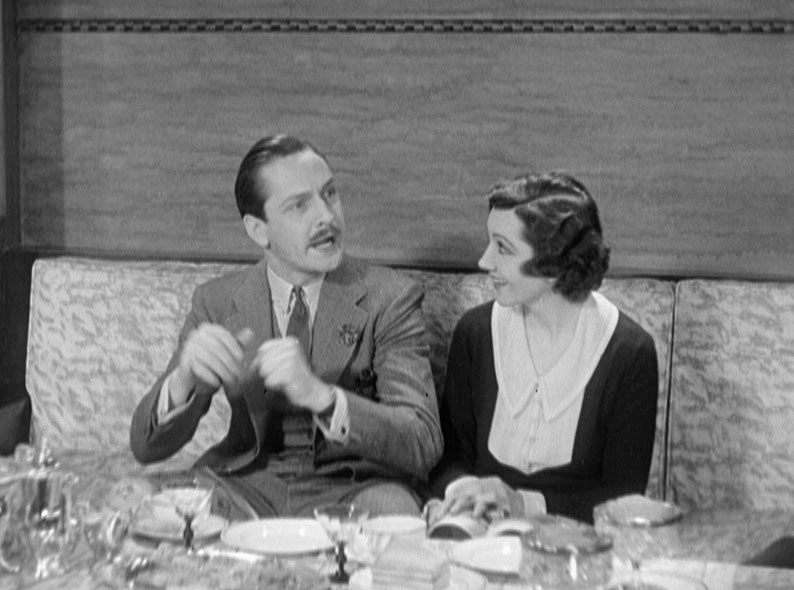
If this makes me sound unremittingly cynical, know that that the above was the basis for George Cukor's 1940 The Philadelphia Story, one of the most wonderful, witty and heart-lifting romantic comedies in all of cinema history. Beating that film to the punch by nine years was Honor Among Lovers, which I gather was released in the UK with the 'u' restored to 'Honour', but has arrived on Blu-ray with its original American spelling of that word intact. It would have been interesting to see how the film might have fared once the Production Code kicked into high gear had the filmmakers gone with the working title of Sex in Business.
Right off the bat, the film plays a few games with the above-detailed formula by dispensing with the expected meet-cute moment and having the two individuals at story's centre already familiar with each other and on the best of terms. He is successful and savvy company investor Jerry Stafford (Fredric March), and she is his personal secretary Julia Traynor (Claudette Colbert), and immediately we're in what would now be rightly considered problematic territory, with a wealthy businessman in a position of authority making a play for his young female employee. It's never confirmed how long Julia has been working for Jerry or why he has chosen this moment to stop playing around with other women and fall head-over-heels for her, but it's clear that he's reached this point by the time the film begins.
After a small bit of playfully cod-romantic chat that Julia cheerfully plays along with in a manner that suggests this is standard behaviour for Jerry and not to be taken seriously, Jerry suddenly and unexpectedly ups the stakes by firmly kissing her on the lips. It's clear that Julia is a little rattled by this uninvited powerplay move, even when Jerry claims (unconvincingly) that he was as surprised as she was by this probably pre-planned manoeuvre. He then invites Julia to go away with him on a cruise and reveals just how he really feels about her, to which Julia responds by pointing out how different their lives are and assuring him that he could never give her what she really wants. She also has to smilingly decline his offer to accompany him to the ball game that afternoon because she's already arranged to go with someone else, and it's clear to Jerry that the person in question is another man. His good humour drains in an instant and he responds with a coldly delivered request for Julia to call a woman he has been casually dating named Maybelle (Avonne Taylor) and ask that she join him in Julia's place. "Tell her to wear her prettiest clothes," he tells her, then adding, "If a girl must wear clothes, I like them pretty," a line that would definitely have been given the chop by the Hays Office a couple of years later. It's a move clearly designed as a symbolic slap to Julia's face, cheapening the apparent sincerity of his earlier words with the suggestion that she could be so easily replaced, and one look at Julia's expression confirms that it hit its intended mark.
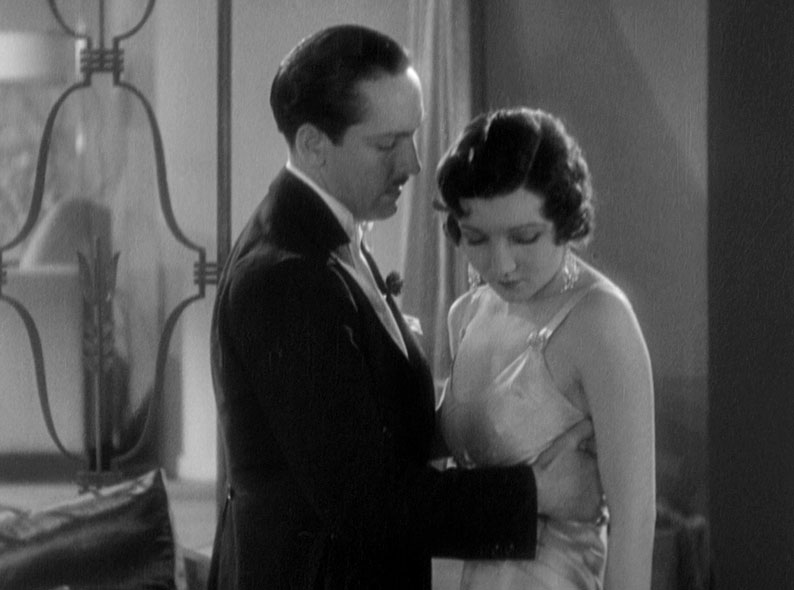
At this point we're 15 minutes into a 75-minute film and just about everything is up in the air, yet I already felt heavily invested in Julia's future, thanks in no small part to how impeccably her character is written and portrayed. She's gifted real wit and strength of character by a consistently sharp screenplay by an uncredited Gertrude Purcell and Austin Parker (Parker does receive an original story credit), but is really brought to life by Claudette Colbert, whose positivity and good humour combine with her radiant beauty to make it easy to see why Jerry would be so attracted to her. And until he makes his move, the two have a real chemistry that sparks in part because of the easy-going but obviously successful and pleasingly platonic nature of their working relationship. They're also both economically well defined as individuals. Jerry is shown to have the sort of financial acumen that commands the respect of most of his colleagues, which allows him to waltz into work late and miss an important meeting at which his suggestions are nonetheless taken on board. The cautionary advice on stocks and shares he dishes out to his cheerfully alcoholic friend, Monty Dunn (Charles Ruggles), is also delivered with the sort of conviction that makes it clear he's someone you should always seek the guidance from before making any kind of financial investment. Julia, meanwhile, is no decorative assistant but highly proficient at a job she enjoys, her confidence and good humour not wavering one iota even in the face of the angry protests of the single obstreperous and sexist member of the all-male company chairmanship when presenting Jerry's advice on his behalf. In just a few minutes of screen time, Colbert creates a character that only the most cold-hearted of viewers would not want to see live happily ever after. But with Jerry? He may be rich and well-connected, but come on girl, you can do better. Or can she?
Even before it dawns on Jerry, it's revealed to the audience that Julia already has a boyfriend in the shape of stock trader Monroe Owsley (Philip Craig), man she does seem to be genuinely in love with and who, unlike Jerry, is all for getting married and setting up home. The bond between the couple is tested when they stop off at a lively restaurant after the aforementioned ball game, and Jerry and Maybelle unexpectedly enter with Monty and his latest ditzy girlfriend, Doris (an early role for future leading lady Ginger Rogers). Jerry takes the opportunity to borrow Julia for a dance, which he uses to lead her into a quiet corner and badger her again about going away with him, in the process laying his hands on her and prompting a request to let her go. Yet even as she protests, there's a look on Julia's face (Colbert is so good here) that suggests that in another reality she'd jump at the offer to cruise away with Jerry. Minutes later, she's back at her table with the Monroe, who can't hide his jealously any more than Julia can hide the fact that there may be a sound reason for it. Then, impulsively, they decide to get married first thing Monday morning (I'm guessing it's Friday evening when they make this decision). And, to my genuine surprise, that's what they do. Given the plot requirements of the romantic drama formula, how, I wondered, was this going to be resolved?
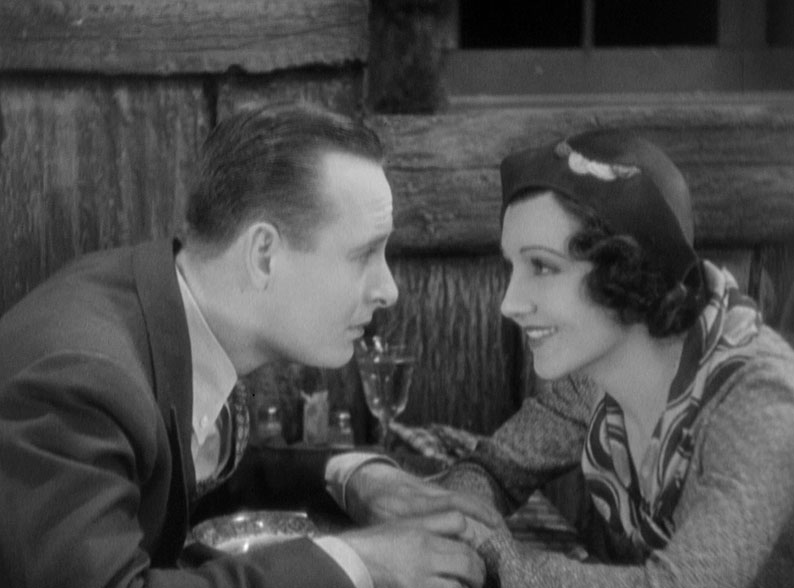
Given its year of production, there's probably a case to be made for claiming that Honor Among Lovers doesn't so much follow the conventions of the romantic drama genre as help to set codes and customs established in the silent era in cinematic stone. It's thus no surprise when aspiring capitalist Monroe turns out later to be a self-centred heel, and the wealthy Jerry proves to be a lot more honourable than his earlier behaviour suggests. Indeed, instead of making an enemy of Monroe, he throws some career-making business his way, and later covers for him when his drunken jealousy results in an incident that has the potential to land him in jail. And all the while, through every low point, Julia stands devotedly by her increasingly unworthy husband, genuinely caring for him despite a growing conviction that she may have married the wrong guy. Jerry, meanwhile, appears to abandon any hope of being truly happy, his former joyfulness only briefly resurfacing when he meets Julia again at a party to celebrate her first wedding anniversary. Yet while Monroe is already acting like a self-absorbed and money-obsessed dick by this point, Jerry still hasn't learned his lesson about grasping and kissing Julia uninvited, one she again responds to with a mixture of discomfort and shame. Finally, Jerry seems to get the message, one that it seems to have taken too many men out in the real world a damn sight longer to absorb.
While the arcs of all three main characters do play largely to expectations, their collective story is told with confidence and purposeful cinematic flair by Dorothy Azner, a rare female director in the male-dominated Hollywood of the day. That it seems inevitable that Julia and Jerry will ultimately end up together matters little in a genre in which we're regularly steered to see such unions as the only logical and satisfactory conclusion to the tale. And while I still have issues with the entitled nature of Jerry's early attempts to woo Julia, I later found myself wondering if the true reason for her initial discomfort was that she had already committed herself to someone else by the time the man she was really attracted to finally got around to admitting how he felt about her. Yet as the final act unfolded, I began to suspect that film might not have the predicted happy ending after all – with just four minutes of the film left to run, I could still not see how Jerry and Julia could possibly end up as the couple we by then know that they should be. Kudos to all concerned for keeping me on tenterhooks right up until the final few seconds, and by having the story revolve primarily around Julia and making her such a rounded and instantly likable character, the filmmakers – and especially the hugely talented Colbert – had me really caring for her fate. It's this, and some subtle but effective subtextual digs at the corporate executive class, entitled male attitudes to women, and even the institute of marriage itself, that lift this film well above the genre average and make it such an ultimately enthralling watch.
The 1.37:1 1080p transfer on Indicator's Blu-ray was sourced from an HD restoration by Universal, created from a 4K scan of a 35mm composite fine grain print in 2017. The resulting picture quality is strong in its stability and its decently balanced contrast, but shows its age (and, perhaps, the fact that the original negative was not the source for the restoration) in the slight softness of the image and a resulting lack of HD crispness to the detail. While initially this may trigger a pang of disappointment, the unwavering consistency of the image quality means that this is never a distraction and still way better than it would have once looked on TV or home media of any description. It's also worth remembering that we've been spoilt on this score in recent years, and that not all source material for restorations is as pristine as others, especially when the film in question was made 93 years ago. The picture is also almost completely clean of any former dirt or wear, with the only blips I spotted were a few small dust spots occurring around a couple of the dissolves, and some minor scratches and small signs of damage here and there, but they never last for more than a few frames.
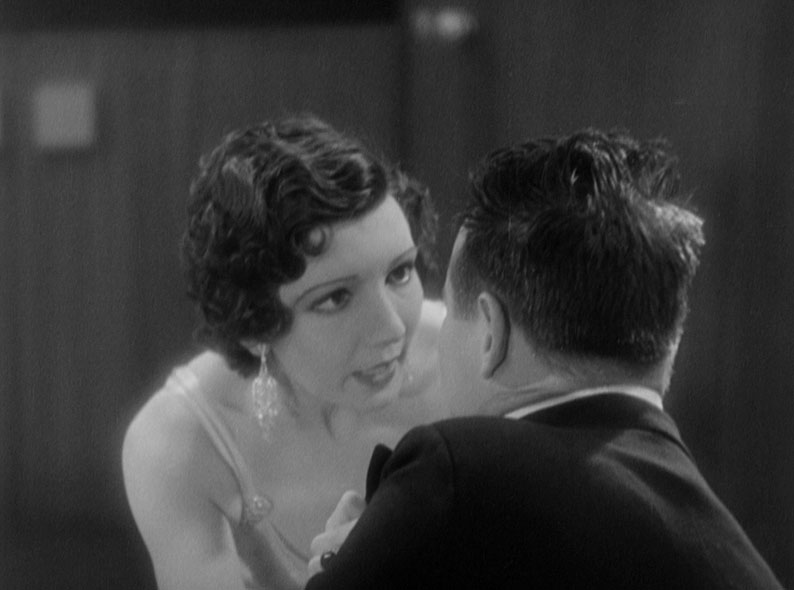
The Linear PCM 10 mono soundtrack definitely shows its age, with a narrow tonal range to the treble-leaning dialogue, effects and music, and audible background fluff throughout, but the spoken words are always clear, even to someone with my belting tinnitus. It's also important to remember that when Honor Among Thieves was made, synchronised sound was still in its infancy, and the fact that it sounds as good as it does after all this time is another testament to the work of the restoration team.
Optional English subtitles for the hearing impaired are available.
Audio commentary with Eloise Ross
Australian academic and curator Eloise Ross delivers an always interesting assessment of the film and its makers, with background details provided on the actors, director Dorothy Azner, the film's reception, and other films featuring the stock market that appeared in the wake of the 1929 crash. She highlights Azner's compositional skills and sometimes complex dolly shots, praises Colbert's acting in pivotal emotional scenes, and were it not for Ross I would not have spotted the very brief appearance of a young Elisha Cook Jr as an office boy (once you know, he's instantly recognisable, despite being some distance from the camera). Ross also compares the film to Azner's 1932 Merrily We Go to Hell, which I've not yet seen and which Ross assures us is a sharper and more acerbic commentary on marriage and obligation, which had me hoping that also gets a Blu-ray release in the not-too-distant future.
George Folsey Oral History (129:37)
An audio-only interview with Honor Among Lovers cinematographer George Folsey, conducted in the manner of the British Entertainment History Project interviews you'll find on many other Indicator Blu-ray releases. As the two hour plus running time suggests, this is a deep dive into Folsey's life and career, deep enough to prove potentially heavy going if cinematography is not your bag. The emphasis is on Folsey's early career, from his first job as a general dogsbody at Famous Pictures Studios through his work as a camera assistant to his promotion to second cameraman and feature cinematographer. Individual jobs are discussed, and the conversation is peppered with interesting stories about the many films he has photographed (the IMDb lists 168), a few of which – Meet Me in St. Louis, Adam's Rib, The Band Wagon, Seven Brides for Seven Brothers, Forbidden Planet – have since been promoted to classic status. The prime focus is on the first half of Folsey's career, with several of his later films given only brief coverage, and Honor Among Lovers gets no mention at all.
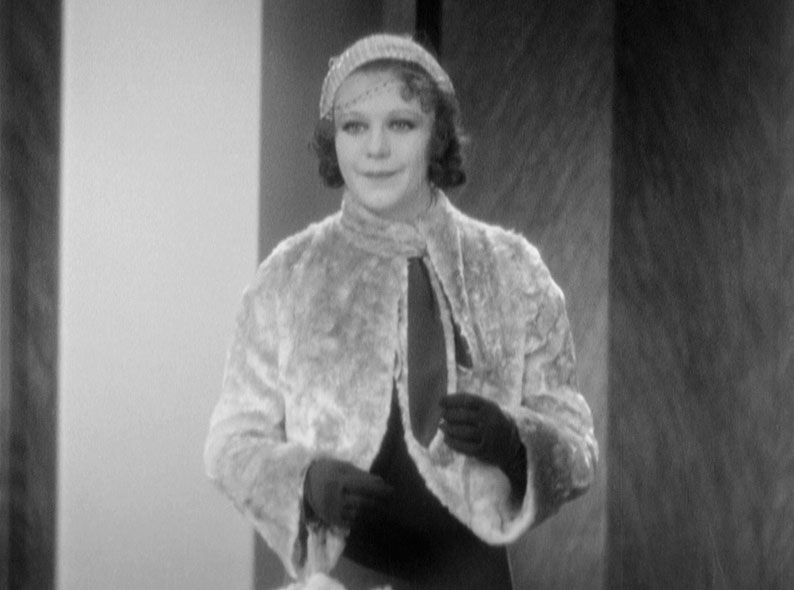
Sugar and Spice: Lucy Bolton on Ginger Rogers (12:34)
In place of the expected profile of lead actor Claudette Colbert (coming on a later disc, perhaps?), academic Lucy Bolton looks at the early career of Ginger Rogers, who has a supporting role in Honor Among Lovers as Monty's airhead girlfriend Doris. Bolton is clearly an enthusiastic fan of Rogers' work, and really talks up her contribution to the film, describing her performance as "terrific" and claiming that she owns every scene that she appears in. Don't get me wrong, if you don't find the whole dumb blonde trope irritating, Rogers is certainly fun here, but Mae West's scene-stealing debut in Night After Night it is definitely not. This is still a useful piece, with Bolton providing details of Rogers' entry into showbusiness and her subsequent rise to fame, including her much-loved ten-film partnership with Fred Astaire. A tad disappointingly, my favourite Rogers performance – as the title character in William A. Wellman's glorious Roxie Hart (1942) – doesn't get a mention, but in a career that spanned 95 films and TV shows, there are only so many you can cover in 12 minutes.
Image Gallery
27 screens featuring crisp monochrome promotional stills, lobby cards, scans of ragged-edged press booklet pages, a newspaper ad from the New York Times, a colour transparency of a promotional ad (complete with cardboard frame), and a small selection of posters, including what research suggests is probably a Swedish one where the film has been given the intriguing title Nära Sing-Sing.
Hail and Farewell! (7:03)
The first of two wartime propaganda pieces that were produced during Dorothy Azner's time as director and supervisor at the military film unit responsible for their creation. That's a good enough reason for their inclusion for me, as these are films that we otherwise would probably never get to see, and whose inclusion on Indicator discs I thus always welcome. Having said that that, there's not much to say about this first one, which plays like an official thank you to those who joined the Women's Auxiliary Army Corps (WAAC), and whose sincerity is dented just a tad by the two officers – one male, one female – who have to keep looking down at their notes whilst stiffly delivering their appreciative speeches to camera. Frankly, this is just a warm-up for…
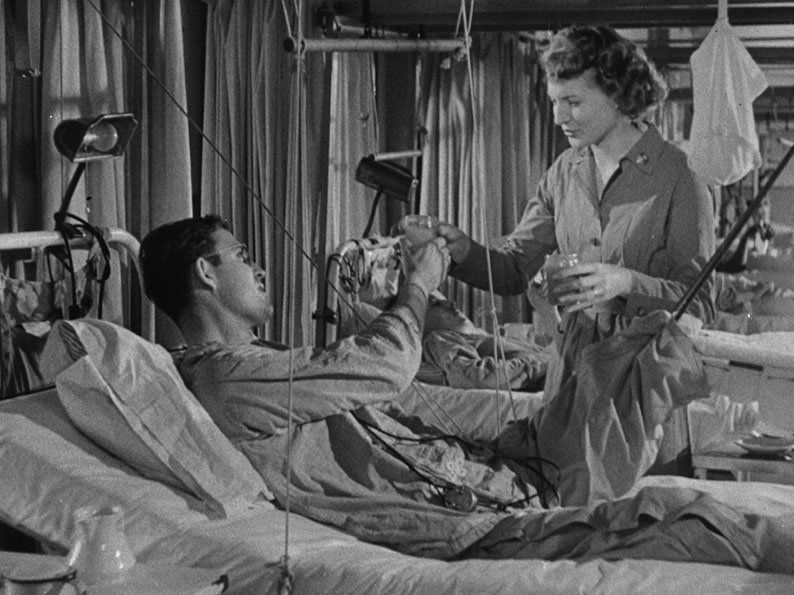
To the Ladies (14:58)
Also made during Dorothy Azner's time with the military film unit, this 1944 recruitment film for the Women's Army Corps (formerly the WAAC) doesn't pussyfoot around, contrasting the more superficial pastimes of the women in the American town of Middleton with the gruelling hardships being endured by those fighting on the front line. It doesn't hold back here, hitting us with footage of seriously injured soldiers, a yelp-inducing open wound, and a thumbprint being taken from the burnt hand of a battlefield corpse as the Middleton women shop for shoes and dine in cafés in their Sunday best. Later, the (male) narrator really goes for the jugular. "Let's stop flattering ourselves that the women of America are doing an all-out job in this war," he says with just a whiff of contempt over footage of Middleton housewives crowded into a clothing store, "You're not." We then cut to slow pans of battle-weary soldiers looking accusingly into the camera, as narrator boy adds, "And these men know it." At this point, I had the feeling he was struggling to avoid calling every woman who immediately didn't join up a self-centred bastard. Balance is provided by a midsection that emphasises the importance of the WAC, and takes a more upbeat look at some of the crucial work that its recruits do. And crucial work it absolutely was during WWII, although the narration is rather fond of emphasising jobs that require "delicate hands," which range from operating a huge X-ray machine to lighting a pipe for a hospitalised soldier. These sometimes very male notions of flattery hit a condescending peak when covering the recreational facilities available to the WACs, where a beauty parlour is described as, "The one institution without which no normal woman can live." Oh, do you reckon? A fascinating and well-constructed guilt-trip of a call to enlistment nonetheless, one that steadfastly refuses to pull its punches.
Booklet
The lead essay here is a compellingly written look at the film, director Dorothy Azner and the character of Julia by freelance critic, curator and film historian Pamela Hutchinson. The superb opening three paragraphs alone, which examine the symbolic role of bracelets in this and similarly themed films, left me feeling analytically inadequate. Next is a piece that nicely repurposes one of the film's working titles, Sex in Business, for a collection of quotes from director Azner and cast and crew members, which as the introduction points out, tend to focus on her sex and status in a male-dominated industry. This is followed by an extract from an interview, conducted over several months and first published in Cinema in 1974, in which Azner details how she became a film editor and how that eventually led her into directing. Extracts from several contemporary reviews are followed by a piece by Anthony Nield on Azner's work on a handful of wartime training films for the WAAC and WAC, the specifics of which have apparently proved frustratingly hard to track down. The booklet is also handsomely illustrated with promotional stills and those press booklet page scans from the gallery.
An engrossing romantic drama that survives the problematic behaviour of its lead male character thanks to a sharp script, assured direction, some moments of real screen chemistry between Colbert and March, and Colbert's captivating central performance. Although not the sharpest restoration on the block, this is still a solid and pleasingly consistent transfer, and as ever with Indicator, the special features are top-notch. Recommended
|